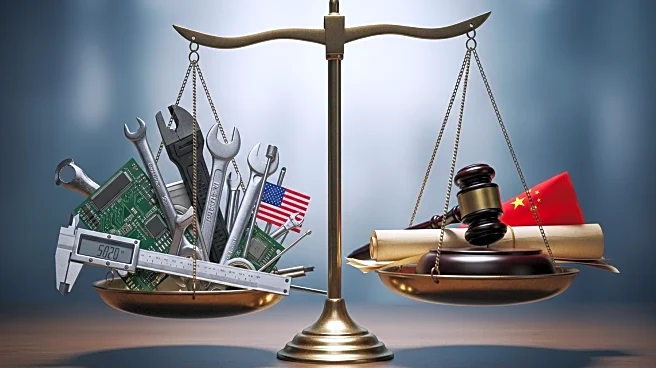What's Happening?
Dan Wang, an analyst known for his insights into China's domestic dynamics, has proposed a new perspective on U.S.-China relations. In his book 'Breakneck: China's Quest to Engineer the Future,' Wang contrasts the leadership styles of the two nations, noting that China's leadership is dominated by engineers while the U.S. is led by lawyers. This distinction raises questions about the future interactions between these two global powers. Wang suggests that the U.S. could learn from China's successes in infrastructure and manufacturing, areas where China has excelled due to its engineering-focused governance. He also points out that China's recent economic challenges, including high youth unemployment, are partly due to its focus on advanced manufacturing over service jobs. Wang's observations come at a time when both countries are facing economic stagnation and political challenges.
Why It's Important?
The insights provided by Dan Wang are significant as they offer a fresh perspective on the ongoing U.S.-China rivalry. By highlighting the differences in governance styles, Wang suggests that the U.S. could benefit from adopting some of China's strategies, particularly in infrastructure development and manufacturing. This could have profound implications for U.S. economic policy and competitiveness. Additionally, Wang's analysis underscores the importance of understanding the cultural and structural differences between the two nations, which could influence future diplomatic and economic interactions. As both countries navigate their respective challenges, Wang's observations could inform policymakers seeking to enhance their nation's global standing.
What's Next?
Wang's propositions may prompt discussions among U.S. policymakers about integrating engineering-focused strategies into American governance. This could lead to a reevaluation of current policies, especially in areas like infrastructure and manufacturing. Furthermore, as the U.S. and China continue to compete on the global stage, Wang's insights might influence future diplomatic strategies, encouraging both nations to learn from each other's strengths. The potential for policy shifts in the U.S. could also impact international relations, as other countries observe and react to changes in U.S.-China dynamics.
Beyond the Headlines
Wang's analysis invites deeper reflection on the cultural and ethical dimensions of governance. The contrast between engineering and legal paradigms raises questions about the balance between efficiency and individual rights. As the U.S. considers adopting elements of China's approach, it must also weigh the implications for civil liberties and democratic values. This discussion could lead to broader debates about the role of government in shaping economic and social outcomes, both domestically and internationally.










